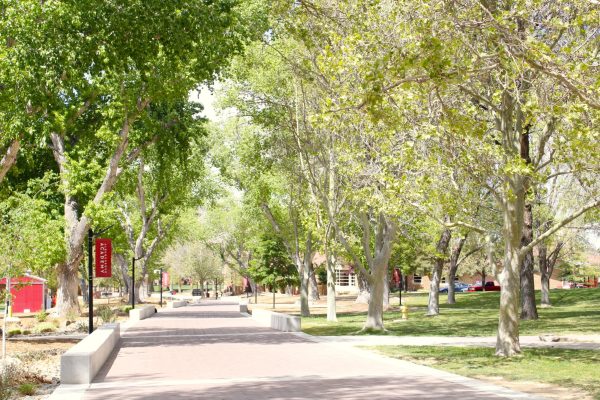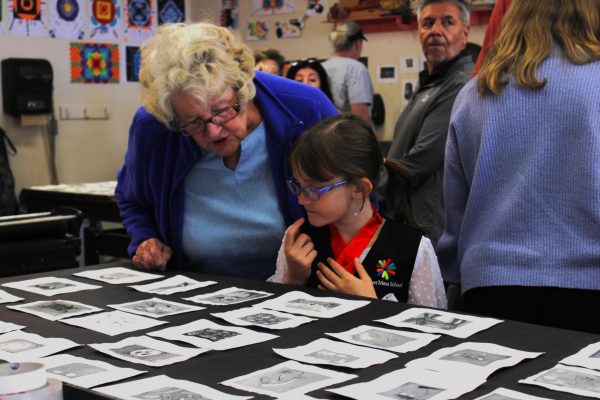Get to Know Next Year’s Student Senate Leadership
Who’ll be in charge?
Courtesy of Mireya Macías ’23 and William Weinstein ’23
2022-2023 Student Senate President Mireya Macías ’23 (left) and Senate Vice President William Weinstein ’23 (right).
The Student Senate at Albuquerque Academy is an underappreciated organization that works to improve the quality of student life at our school. The Senate’s goals are primarily to implement policy changes that make every student feel welcome, respected, and safe. Next year, Mireya Macías ‘23 will be your Senate President, and William Weinstein ‘23 will serve as your Vice President. They both are deeply involved in enriching the Academy’s community. Let’s get to know more about these two great leaders.
Macías was inspired to join the Student Senate through her interest in politics. Prior to joining the student government body at the Academy, she volunteered for Hillary Clinton’s 2016 presidential campaign. Through grassroots efforts, Macías worked to collect votes for Clinton. This volunteering allowed her to become “wrapped up in the political narrative.” So, Macías claimed that “it was a clear line of progression” from assisting a campaign for a position in the national government to running for a position in the student government. She has been involved in creating new school policies and leading her class since 8th grade, when she was part of the student council. Macías’ first priority as president to create the ideal Senate is to “build a framework for how policy gets passed at our school, because we don’t really have an established procedure” for systematically introducing new ideas and changes into our community. Some specific policy changes that Macías would like to accomplish in the following school year include (but are not limited to) increasing inclusivity of the dress code and enhancing the efficiency and carbon footprint of school gardening systems. Additionally, Macías aims to help SDLC in their creation of affinity groups at school that enable students to form communities with others from similar racial and ethnic backgrounds. One of the main roles of the Senate is to pass new bills that foster a better environment at our school. Macías noted that a critical step in the difficult process of developing a new policy change is listening to the students’ voices through town halls, listening sessions, surveys, and other methods. This feedback allows the Senate to create an inclusive community for all of the Academy’s students. What’s important to note, however, is that the process of passing a new policy change is complicated and takes more time than simply writing a bill and obtaining a majority vote. Macías believes that the Senate is sort of like the “middleman” between the Academy administration and the Academy students, which is why any new idea must be approved by both parts of the school. Indeed, obtaining approval from the administration is often the significantly harder part of the process as it requires lengthy discussions with several teachers and faculty. Macías argued that the success of these discussions is dependent on the context and opinions around a particular change, making it difficult to judge the timeframe to pass a new bill.
Weinstein has quite a different background in student government than Macías. He has only been a senator for one school year, and was inspired to run due to his “[concern] with the disconnect in our community,” which was worsened due to the COVID-19 pandemic. He felt that joining the Student Senate would be the best way to allow students to reconnect with each other more fluidly. Ideally, Weinstein would like the school to be one united and “cohesive” community. He acknowledged that “there will always be people who feel less included and less welcome in our community,” but his goal is to improve inclusivity. This year, he has worked on a proposal concerning gender pronouns in order to take an active step towards inclusivity and solidarity. His primary goal next year will be “supporting Mireya as president [of the Senate]” and “making sure that everything is lined up for her to succeed” in her new job. He would also like to expand student outreach programs, and “increase communication [between] the Senate and the Board of Trustees to give them accurate, meaningful depictions of student life at the Academy.” Weinstein’s favorite part about our school is that the “Academy community is so unique.” “I’ve really grown up with the Academy,” he remarked, “and I have a deep love for this school.” This love motivates him to make the changes that he proposes to the Senate. Every day, he attempts to give back to the school that has already provided him with so much.
Weinstein, like Macías, further emphasized the role of the Senate as a translator between the students and the administration, Board of Trustees, faculty, and others. Being able to talk to both bodies is why the Senate is such an integral part of our community.
In his spare time, Weinstein enjoys playing the piano, singing, and is also an avid cross-country and track athlete. Macías, on the other hand, can be found writing and editing articles for The Advocate, hiking, and going on walks with her two dogs. She also enjoys spending time with her family and exploring the outdoors. Both Weinstein and Macías love history classes at the Academy. Macías said that AP World History, in particular, “gave me a comprehensive understanding of the world” and its interconnectedness.
Finally, Macías and Weinstein are both quite passionate about our school. This passion is the reason they devote so much of their time to the Senate. They are determined to make your experience better as you make your way up the path towards graduation. So, you can certainly be assured that Macías and Weinstein will lead us with courage and bravery as we charge into another year.










